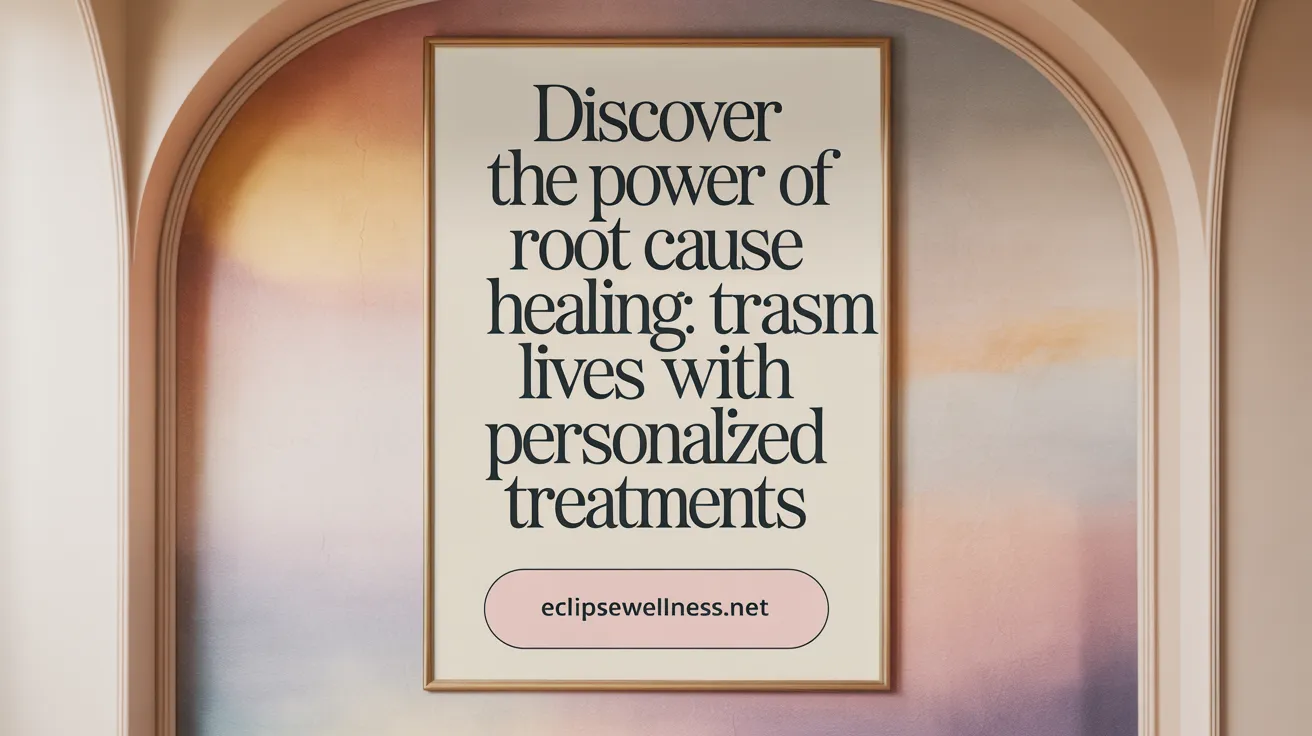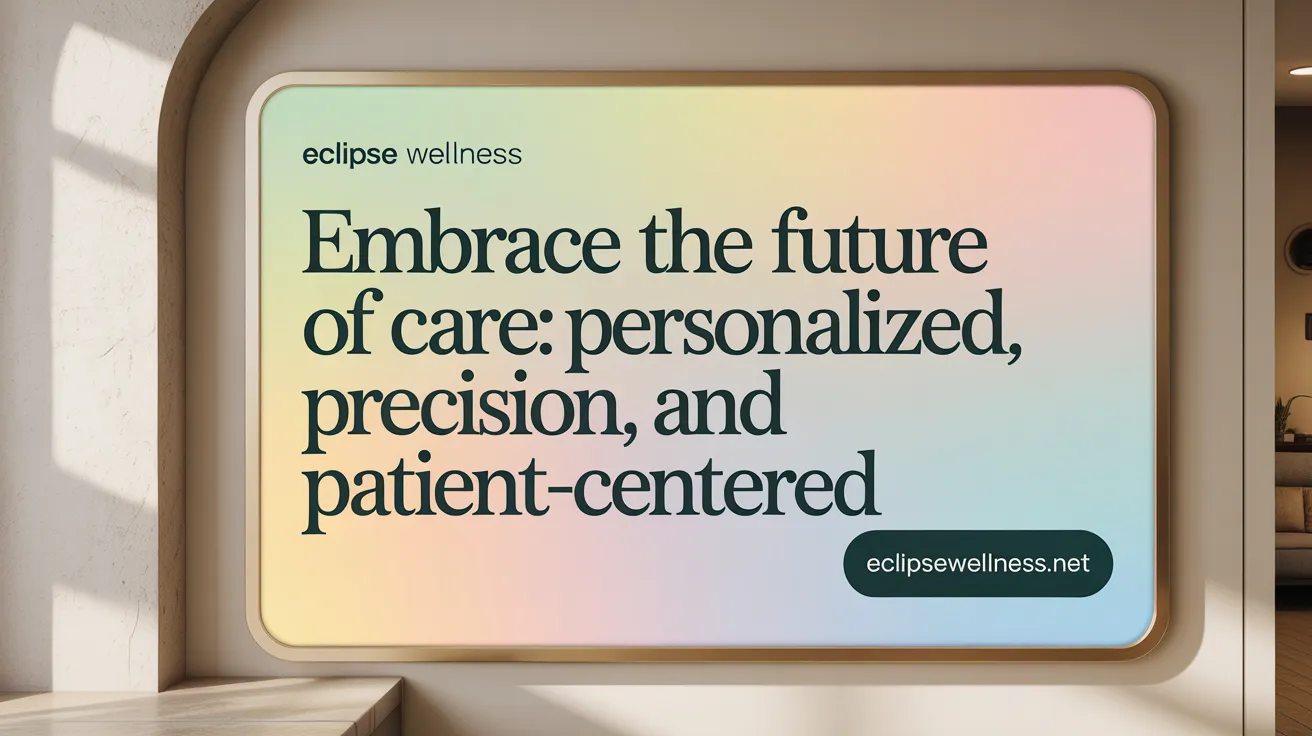Introduction: The Power of Integrative Care in Healing
Integrative care represents a comprehensive approach to health that combines conventional medicine with complementary therapies to treat the whole person — mind, body, and spirit.
At its core, integrative care is holistic and patient-centered, tailoring treatments to individual needs rather than just addressing symptoms. This personalized focus ensures that every patient's unique health story guides their healing journey.
Central to these approaches are natural and diet-based therapies, alongside mind-body practices such as meditation, acupuncture, and mindfulness. These methods support the body’s innate ability to heal, improve resilience, and enhance well-being.
By emphasizing root causes of illness and fostering a compassionate partnership between provider and patient, integrative care offers transformative possibilities for chronic and complex health conditions.
Healing Through Personalization: Root Cause Treatments That Transform Lives

How do integrative treatments focus on root causes rather than symptom masking?
Integrative medicine prioritizes uncovering and treating the underlying causes of illness instead of merely suppressing symptoms. This approach empowers patients to achieve lasting health improvements by addressing factors such as immune dysfunction, environmental toxins, and dietary imbalances. See more on Root Cause Healing Results.
What specialized testing and natural supplements are commonly used?
Practitioners like Dr. Kelly McCann Functional Medicine employ advanced diagnostic tools, including Bacterial DNA Analysis Impact and comprehensive lab testing, to precisely identify root causes. Treatment plans often incorporate natural supplements, Botanical Remedy Success, and tailored dietary strategies, minimizing reliance on pharmaceuticals and supporting the body's inherent healing capacity.
Which chronic conditions have shown improvement through these approaches?
Patients have reported significant progress with complex chronic issues such as Lyme Disease Treatment Success, mold and mycotoxin-related illnesses, Chronic Rash Healing, Ear Infection Recovery, and mast cell crises. These successes highlight the effectiveness of personalized care that integrates natural therapies and precise diagnostics.
How does Dr. Kelly McCann's compassionate, patient-centered approach enhance healing?
Dr. McCann listens attentively to patients, respects their health beliefs, and collaborates closely to develop individualized care plans. Her empathetic style fosters trust and encourages active patient involvement, which is crucial for managing chronic, multifaceted health conditions and achieving transformative outcomes. Learn more about her Compassionate Patient Care Stories.
Integrative medicine's focus on personalized, root cause treatments offers patients new hope for recovery and well-being. Through advanced testing, natural therapies, and compassionate care, practitioners like Dr. McCann guide patients toward functional health and renewed vitality. Explore additional Patient Success Stories for inspiration.
Integrative Oncology: Supporting Cancer Patients Beyond Conventional Care
Incorporation of Complementary Therapies During and Post-Cancer Treatment
Integrative oncology combines standard cancer treatments with integrative therapies in cancer care to address the whole person—mind, body, and spirit. Techniques like acupuncture, yoga, meditation, and massage are incorporated alongside chemotherapy and radiation to reduce side effects and improve overall well-being.
Mindfulness, Acupuncture, Yoga, and Lifestyle Oncology Programs
Programs such as those at City of Hope and UC Osher Center promote mindfulness-based stress management techniques, acupuncture, yoga, and tai chi to help manage pain, anxiety, fatigue, and sleep disturbances. These therapies empower patients to actively participate in their healing and recovery.
Patient Stories Highlighting Improved Quality of Life and Symptom Management
Patients like Diane Miller, managing stage 4 lung cancer, found integrative practices helped her feel calmer and more in control, especially during stressful scans. Maja Flannery used acupuncture and yoga to support chemotherapy recovery for endometrial cancer, while Mark’s bile duct cancer post-treatment stomach pain was alleviated through acupuncture and personalized diet adjustments.
Holistic Survivorship Programs for Cancer Recovery
Survivorship programs emphasize physical therapy, exercise, massage, acupuncture, and nutrition counseling. Kathy, battling uterine cancer, benefitted greatly from such a program at the UC Cancer Center, which aided both her treatment and holistic recovery journey.
These stories underscore the positive impact of integrative oncology, where personalized, compassionate care fosters improved quality of life and symptom relief beyond conventional cancer therapies.
Lifestyle Medicine and Chronic Disease: Empowering Patients for Lasting Health

How does lifestyle medicine support managing chronic diseases like diabetes, heart disease, and long COVID?
Lifestyle medicine focuses on empowering patients by addressing the root causes of chronic diseases through personalized lifestyle changes. Conditions such as diabetes, heart disease, and long COVID are managed effectively by integrating diet, stress reduction, and mindfulness-based stress management techniques into daily routines. For instance, patients have reported significant improvements in blood sugar control and symptoms of long COVID through these holistic strategies. See detailed examples in the Lifestyle Medicine transformation and Chronic condition improvements and Tim Barr long haul COVID recovery.
What role do personalized diet, stress reduction, and mindfulness play?
Personalized diet plans tailored to individual sensitivities and nutritional needs help reduce inflammation and improve metabolic health. Stress reduction techniques and mindfulness practices—such as meditation and mindfulness-based stress management techniques—enhance the mind-body connection, helping patients manage symptoms and improve emotional well-being. Such interventions encourage sustainable health improvements rather than temporary symptom relief. These approaches are highlighted in Patient Testimonials with Holistic Health Approach and Integrative Health Patient Stories involving Meditation Practices.
What patient experiences highlight improvements in symptoms and energy?
Many patients report restored energy, reduced pain, and diminished symptoms after adopting integrative lifestyle medicine approaches. For example, cancer survivors incorporating mindful diet choices and stress management find better quality of life, while individuals with chronic fatigue and type 2 diabetes experience increased vitality and symptom alleviation. These successes demonstrate the power of whole-person care in achieving lasting health. See narratives in Brad Pike's heart health journey and cancer survivorship, Integrative Medicine Success Stories on Real Patients' Healing Journeys, and Patient Success Stories and Outcomes at UCLA Health.
How has integrative care affected physicians’ passion and treatment efficacy?
Physicians practicing lifestyle and integrative medicine often describe a renewed sense of purpose and effectiveness. By emphasizing personalized, holistic care, clinicians witness dramatic patient health improvements which inspire continued commitment. This approach fosters collaborative, empathetic partnerships that motivate both clinicians and patients toward positive health outcomes. Insights on this are found in Practitioner experiences in integrative health care and Lifestyle Medicine transformation and Physician satisfaction.
Mind-Body Harmony: Managing Pain, Mental Health, and Autoimmune Conditions

Integration of acupuncture, meditation, yoga, and biofeedback
Holistic integrative care increasingly combines acupuncture, meditation, yoga, and biofeedback to address complex health issues such as chronic pain, anxiety, depression, and autoimmune diseases. These therapies focus on harmonizing the mind and body to promote natural healing and symptom relief. Acupuncture, for example, helps restore energy balance and reduce inflammation, while meditation and yoga foster stress reduction and emotional resilience through mindfulness-based stress management techniques. Biofeedback provides patients with tools to regulate physiological responses, improving pain management and overall well-being. For more on acupuncture success, see Success Stories at Sonoma Acupuncture and Integrative Medicine Success Stories.
Success in treating chronic pain, anxiety, depression, autoimmune diseases
Patients across multiple integrative health centers report significant improvements:
- Chronic pain sufferers like Mark, who managed bile duct cancer pain through acupuncture and diet, eliminated reliance on painkillers (Brad Pike's cardiology care and lifestyle changes).
- Individuals coping with depression, such as Shaynee Novak, found relief using holistic mind-body approaches and mindfulness-based stress management techniques (Patient Stories and Outcomes at University Hospitals).
- Autoimmune disease patients, including those with Hashimoto's thyroiditis or PCOS, benefited from personalized nutrition and lifestyle interventions combined with mindfulness-based stress management techniques (WellBe inspirational health journeys).
These successes underscore the potential of non-pharmaceutical strategies to restore balance and improve quality of life; see also Patient Success Stories from The Spring Center and Pacific Integrative and Functional Medicine Patient Testimonials.
Patient examples illustrating symptom relief without heavy pharmaceuticals
Several patient stories highlight natural healing thriving through integrative approaches:
- Kathryn Parsons overcame multiple allergies and brain fog via a low-histamine diet paired with acupuncture, avoiding medications (Integrative Care at Texas County Memorial Hospital).
- Jennifer Esposito healed celiac disease symptoms after 30 years through natural treatments targeting root causes (Healing Journeys at WellBe.
- At The Spring Center, chronic rashes and Lyme disease symptoms resolved through specialized testing, natural supplements, and botanical remedies without pharmaceuticals (Patient Success Stories at The Spring Center).
These narratives demonstrate that combining diagnostic precision with holistic care can reduce dependence on drugs.
Holistic approaches combining dietary changes and mind-body techniques
Tailored diets rich in plant-based, anti-inflammatory foods frequently complement mindfulness-based stress management techniques. Patients adopting these regimens, such as high-fiber, plant-based diets alongside yoga and mindfulness, experience enhanced immune function and symptom control. Dr. Nathalie Bera-Miller’s patients improved gut health and balanced blood sugar through elimination diets and meditation (Dr. Bera-Miller Patient Testimonials). Likewise, biofeedback and acupuncture support physical healing and mental calm, creating a comprehensive care experience that empowers patients to take active roles in their wellness journey.
Collectively, these integrative treatments foster a healing environment where physical, emotional, and social aspects are addressed with compassion and personalization, aligning with contemporary patient-centered care ideals (Integrative Medicine at UCLA Health Patient Stories, Lifestyle Medicine Transformation and Patient Outcomes).
Precision and Innovation: The Future of Personalized Integrative Care

How are advanced personalized medicine approaches shaping patient care?
Modern integrative health increasingly incorporates advanced personalized medicine techniques like pharmacogenomics and genomic sequencing in personalized therapies. Pharmacogenomics analyzes a patient’s genes to guide medication choices, improving efficacy and reducing side effects, as exemplified by veteran Dariton Robinson who gained better cholesterol control through tailored treatments. Similarly, genomic sequencing has made it possible to develop novel, individualized therapies for rare diseases, such as the custom antisense oligonucleotide drug engineered for Mila Makovec, a young girl with Batten disease, which notably decreased her seizures and improved responsiveness.
What role do innovation hubs and integrated care systems play in advancing these methods?
Innovation hubs within integrated care systems (ICSs) are pivotal in fostering the adoption and spread of novel personalized treatments. These hubs promote a culture of innovation by supporting leadership, improving stakeholder engagement, and facilitating collaboration across healthcare sectors. For example, ICS programs in Yorkshire and Humber and Greater Manchester integrated care model enhance responsiveness to local patient needs. Such systems enable smooth integration of precision medicine into routine care, accelerating access for patients.
How have precision therapies transformed patient outcomes?
Personalized therapies have produced profound life changes for numerous patients. Brad Pike's heart health journey, after cardiology procedures, combined lifestyle medicine and mindfulness to manage heart health effectively. Patients battling various cancers, like Frank with Stage 4 melanoma and Mark recovering from bile duct cancer, experienced remission and pain relief through integrative protocols tailored to their biology and lifestyle. These stories highlight how individualized care bridges conventional and holistic strategies, underscoring the healing power when treatments honor genetic and personal context.
Why is patient-centered, integrative care important in precision medicine?
At the heart of advancing precision medicine is a personalized, patient-centered approach that integrates mindfulness-based stress management techniques, diet, and conventional treatments. This synthesis respects each patient’s unique biology, environment, and preferences, thus optimizing outcomes and promoting well-being. The focus on root causes, comprehensive diagnostics, and compassionate care promotes sustainable healing, improved quality of life, and empowered health stewardship. Such thoughtful care exemplifies the future of medicine—precise, innovative, and deeply humane, as seen in Patient Success Stories showcasing integrative health improvements.
Conclusion: Integrative Care as a Pathway to Holistic Healing and Wellness
Holistic, Personalized Healing Journeys
Patients worldwide have reported profound improvements by embracing integrative and holistic health approaches that focus on their unique needs. Success stories from cancer survivors, chronic illness patients, and those with complex conditions highlight the power of therapies addressing root causes, natural interventions, and personalized treatment plans.
Treating Mind, Body, and Spirit as One
Integrative care emphasizes harmony between physical health, mental well-being, and emotional balance. Techniques such as mindful meditation, acupuncture, dietary adjustments, and supportive psychological therapies work synergistically to enhance healing and restore wellness beyond symptom management.
Inspiring Patients to Explore Integrative Care
For those coping with chronic or multifaceted health challenges, integrative medicine offers a compassionate, patient-centered pathway. Exploring these therapies alongside conventional treatments can empower individuals to reclaim their health with a balanced, whole-person approach tailored to their life and values.
